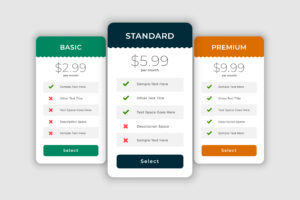Introduction: Importance of customer retention in business growth
Customer retention is not just about keeping clients happy; it is a vital component of sustainable business growth. Research indicates that acquiring new customers can be up to five times more expensive than retaining existing ones. This highlights the importance of creating strategies that focus on building long-term relationships with loyal customers. By nurturing these relationships, businesses can increase profitability through repeat purchases and positive word-of-mouth referrals.
Moreover, customer retention plays a crucial role in establishing brand loyalty and trust. When customers feel valued and appreciated, they are more likely to become advocates for your products or services. This advocacy can lead to enhanced reputation and credibility in the market, attracting new customers through organic means. Therefore, focusing on customer retention not only drives revenue but also helps in building a strong foundation for sustained business success in the long run.
1. Types of subscription models
Moreover, customer retention goes beyond just making a sale; it is about building lasting relationships with your customers. By focusing on retaining existing customers, businesses can create a loyal customer base that will not only continue to make purchases but also become advocates for the brand. When customers feel valued and appreciated, they are more likely to return and make repeat purchases. This sense of loyalty and trust is ultimately what sets brands apart in today’s competitive market.

One key aspect of effective customer retention strategies is personalized communication. By understanding each customer’s preferences and needs, businesses can tailor their interactions to provide a unique experience that resonates with the individual. From personalized recommendations to exclusive offers, these gestures show customers that they are seen as individuals rather than just another transaction. This personal touch helps foster strong emotional connections between the brand and its customers, leading to increased loyalty over time.
2. Benefits for customers and businesses
Businesses must prioritize personalized communication as a key element of their customer retention strategies to build lasting relationships with their clients. Understanding each customer’s unique preferences and needs allows companies to tailor their interactions, making customers feel seen and valued. By leveraging data insights and analytics, businesses can create personalized experiences that resonate with customers on a deeper level, ultimately increasing brand loyalty and driving repeat business.
Personalized communication not only fosters a sense of exclusivity but also enhances the overall customer experience by delivering relevant content and offers. This approach goes beyond generic marketing tactics and acknowledges that every customer is different, requiring customized attention to maintain engagement. By implementing personalized communication strategies, businesses can create meaningful connections with customers, thereby solidifying their place in the market through long-term relationships built on trust and understanding.
3. Personalization and customization options
Personalized communication has become a cornerstone in modern customer engagement strategies, offering businesses a powerful tool to create meaningful connections with their audience. By tailoring content to individual preferences and behaviors, companies can demonstrate a deep understanding of their customers’ needs and desires. This not only fosters a sense of exclusivity but also boosts the overall customer experience by delivering relevant information that resonates on a personal level.
Moreover, personalized communication goes beyond just addressing customers by their names; it involves leveraging data and analytics to anticipate their needs and proactively provide solutions or recommendations. In an age where consumers are inundated with generic messaging, personalized content stands out as both refreshing and valuable. By demonstrating genuine care for each customer’s unique journey, businesses can build trust and loyalty that keeps customers coming back for more.
4. Building brand loyalty through subscriptions
Personalized communication in the realm of subscription services is akin to having a personal concierge at your fingertips, tailoring each interaction to cater specifically to your needs and preferences. By analyzing customer behavior and leveraging data insights, companies can anticipate the next move of their subscribers, offering them exactly what they want before they even realize it themselves. This level of proactive engagement not only enhances the overall customer experience but also fosters a sense of loyalty and connection between the brand and its subscribers.
In today’s digital age, where consumers are flooded with generic marketing messages on a daily basis, personalized communication stands out as a breath of fresh air. It goes beyond just surface-level customization; it delves into the realm of predictive analytics and behavioral understanding to create meaningful interactions that resonate with customers on a deeper level. By showing that you understand their preferences, anticipate their needs, and value their individuality, businesses can forge strong relationships that keep customers coming back for more.
5. Retaining customers with exclusive content
In today’s digital age, where consumers are flooded with generic marketing messages on a daily basis, personalized communication stands out as a breath of fresh air. Instead of bombarding customers with one-size-fits-all promotions and content, businesses are now turning to personalized strategies to truly connect with their audience. By understanding individual preferences, behaviors, and needs, companies can create tailored experiences that resonate with customers on a deeper level.
Personalized communication goes beyond just using a customer’s name in an email – it involves crafting targeted messaging based on insights gathered from data analysis and consumer interactions. This approach not only helps drive engagement but also builds trust and loyalty among customers. In a world where attention spans are shrinking and competition is fierce, the ability to cut through the noise with personalized communication can be a game-changer for businesses looking to stand out in crowded markets.
6. Analyzing customer data for continuous improvement
Personalized communication in the realm of customer subscriptions is a multi-faceted strategy that transcends mere surface-level personalization. It delves deep into understanding the individual preferences, behaviors, and needs of customers through data insights. By leveraging these insights, businesses can craft targeted messages that resonate with customers on a truly personal level, creating a sense of loyalty and connection.
These tailored communications go beyond just addressing customers by their names or including generic recommendations; they speak directly to each customer’s interests, past interactions with the brand, and specific pain points. By taking this personalized approach, businesses can foster long-term relationships with their subscription base and drive higher levels of engagement and retention. In today’s competitive market landscape, where consumers crave personalized experiences more than ever before, mastering the art of personalized communication is key to keeping customers coming back for more.
7. Conclusion: Harnessing the power of subscriptions
These tailored communications go beyond just addressing customers by their names or including generic recommendations; they speak directly to each customer’s preferences, behaviors, and needs. By leveraging data analytics and personalized content, businesses can create a more engaging and relevant subscription experience for their customers. This level of customization fosters a deeper relationship between the brand and the consumer, increasing loyalty and long-term engagement.
Moreover, tailored communications allow businesses to anticipate customer needs and offer proactive solutions, creating a seamless and satisfying experience. Understanding individual preferences enables companies to not only recommend products or services that are genuinely beneficial but also tailor promotions and incentives that resonate with each customer on a personal level. Ultimately, these personalized interactions foster a sense of exclusivity and importance, making customers feel truly valued by the brand.
Read more:










